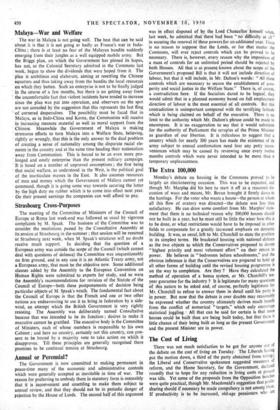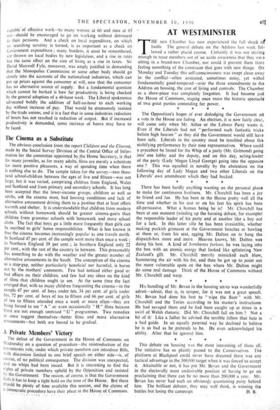The Cost of Living
There was not much satisfaction to be got for anyone out of the debate on the cost of living on Tuesday. The Liberals tidying put the motion down, a third of the party abstained from voting; the Liberal and Conservative spokesmen suggested measures of reform, and the Home Secretary, for the Government, declared roundly that to hope for any reduction in living costs at present was idle. Yet some of the proposals from the Opposition benches were quite practical, though Mr. Macdonald's suggestion that pi ofit. sharing should if necessary be made compulsory is not among these. If productivity is to be increased, old-age pensioners who are capable' of effective work—'as many women at 60 and men at 65 are—should be encouraged to go on working without detriment to their pensions. And a check on local expenditure, on which no searching scrutiny is turned, is as important as a check on Government expenditure ; many burdens, it must be remembered, are thrown on local bodies by new legislation, and a rise in rates has the same effect on the cost of living as a rise in taxes. Sir David Maxwell Fyfe, moreover, was amply justified in demanding that the Monopolies Commission or some other body should go closely into the accounts of the nationalised industries, which can put up prices against the consumer at will, now that the consumer has no alternative source of supply. But a fundamental question which cannot be burked is how far productivity is being checked by the general adoption of a 40-hour week. The Liberal spokesman advocated boldly the addition of half-an-hour to each working day without increase of pay. That would be strenuously resisted by the trade unions, and it is a fact that in some industries reduction of hours has not resulted in reduction of output. But if increased productivity is demanded, some increase of hours may have to be faced.



















































 Previous page
Previous page